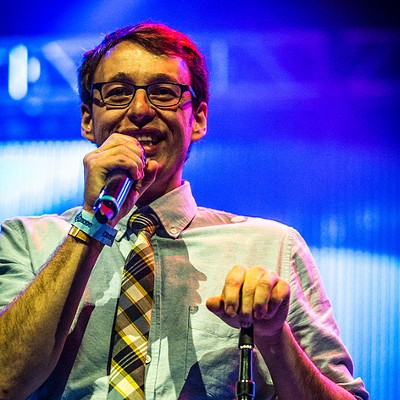See also: As Fate Would Have it, Rubedo Has a New Album
Rubedo, then, is a band of tremendous flexibility. Kyle Gray, who sings, plays moog synthesizers and ukulele, Gregg Ziemba, who plays drums and Alex Raymond, who plays guitar, are exceptional musicians with voracious sonic appetites. Raymond has been known to show up to practice with Peruvian music made by artists influenced by American rock and roll from the '60s. "We hope that [our music] is the voice of the music culture of today, which would encompass all music," says Ziemba. "Because it's all good."
"And it's all accessible," says Raymond.
Their fans are a similarly eclectic bunch, ranging from toddlers who made their parents stop to listen during those sets at DIA to former Mars Volta keyboardist Ikey Owens, who has produced both of Rubedo's full-length albums. "Our music is pretty positive," says Gray. "The typical Rubedo character is someone who cares about themselves enough to give a damn about what's going on on stage."
The band will play an increasingly scarce local headlining show on Saturday, September 13 at the hi-dive. They curated the lineup to include artists with a similar burn to connect with caring audiences. "That's who we want to surround ourselves with," says Ziemba, "people who are making a scene."
This weekend's show is not bound by any particular genre. If Rubedo plays pop, then Turner Jackson plays hip-hop and Dave Devine's Relay plays rock, but those are exceedingly poor descriptions of all three. More than anything else, Gray hopes it will be a "meaningful celebration." One way he'll try to make that happen is by inviting everyone to bring a crystal, with which they will construct a crystal grid. Whether you imagine the resulting transfer of energy as something tangible or not, it will clearly remove the divide that frequently exists between artists and audiences. Rubedo's interest in fostering a community goes beyond shows. Its members grew up here, and they have operated or helped to operate DIY spaces: First Unit E, which was on Sante Fe, and now Dryer Plug Studios, which is in Swansea. There, they have welcomed all comers and watched the rapid development of Denver's music scene, which they think is at a critical moment. Ziemba thinks future cultural observers will look back on what is happening here right now with the kind of respect they apply to, say, pre-Nirvana Seattle. "Everybody is bringing forward a documentation," says Gray. "It's more than a fantasy. It's more than a t-shirt. This is how it happened. It's a movement."
That's a thrilling idea, obviously, although Gray and his bandmates see the perils there. The popular interpretation of Bob Marley is related to the actual Bob Marley about as much as the It's A Small World ride is related to Magellan's travels. It's the same for Kurt Cobain and Sublime and the Beatles and basically every artist for which there is a popular interpretation. "Somewhere along the line all these movements got branded," says Gray. "And then they lost all momentum."
Maybe Denver will get branded, but it hasn't yet, and there is plenty of momentum. Rubedo hopes you'll see it this weekend. It isn't a sound; it's a spirit. Ziemba says the word that best describes the band's intent is duende, a Spanish idea most clearly described in a lecture by the poet Federico Garcia Lorca:
The duende....Where is the duende? Through the empty archway a wind of the spirit enters, blowing insistently over the heads of the dead, in search of new landscapes and unknown accents: a wind with the odour of a child's saliva, crushed grass, and medusa's veil, announcing the endless baptism of freshly created things.
Follow @Westword_Music











